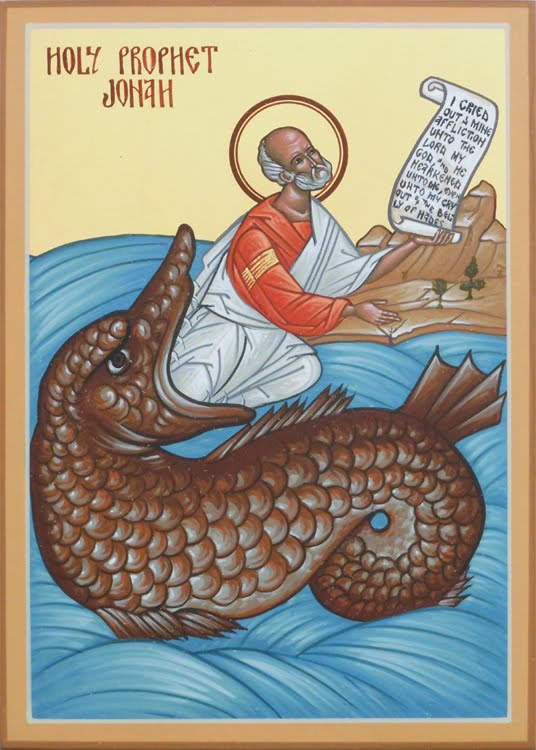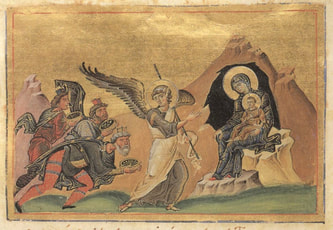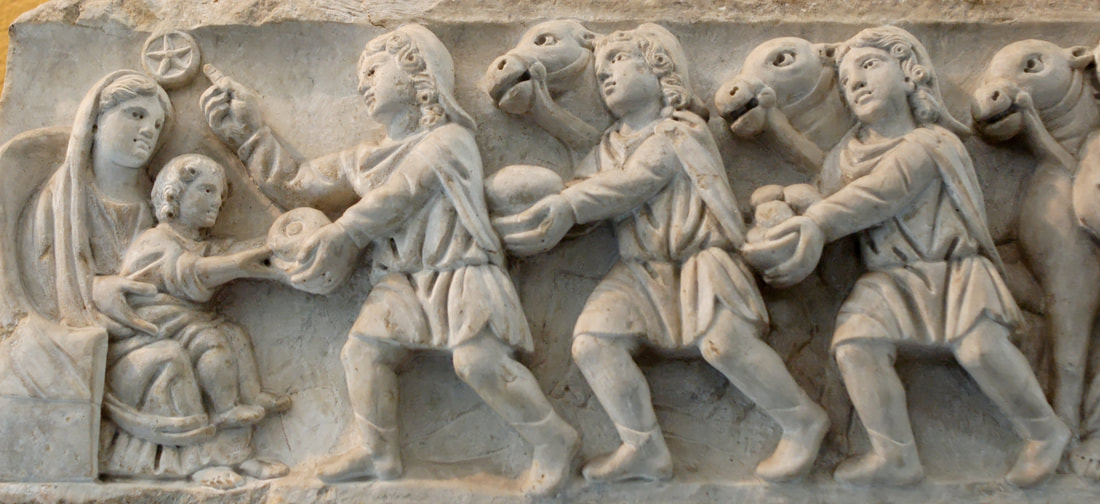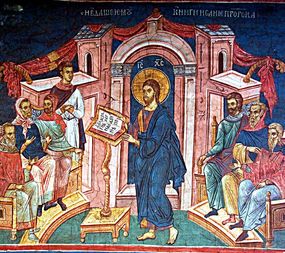 Here we are on this fourth Sunday after epiphany. And so far we’ve followed a star with the Magi, did a Q & A with Philip and Nathanael, and confronted Jonah’s fears and enemies all so God could reveal to us God’s self in the most amazing ways. As you might recall me saying, God will use anything, good or bad, to get our attention and to bring us back to our rightful place in God’s divine love. Today God uses a demon-possessed man (Read Mark 1:21-28) As Mark moves us from the seashore to the sanctuary, God moves our attention to a group of people in a Capernaum synagogue. As they sit in awe of Jesus’ powerful teaching, a man gets up and begins to scream at him. “What have you to do with us, Jesus of Nazareth? Have you come to destroy us? I know who you are, the Holy One of God.” I can’t help but wonder if this man was screaming before Jesus came? Or did Jesus say something to trigger him to go off the rails? Do you think the people knew there was an unclean spirit among them? If so, why did they let him enter the synagogue? By Jewish law it would have made the whole place unclean. In every church, on any given Sunday, sits a person hiding a secret demon that is dying to come out. Mark says the man cried out and Jesus responded by saying, “Be silent, and come out of him!” Jesus speaks to the man’s pain and the unclean spirit submits to the Holy One of God. Did you notice what happened? How God revealed a divine truth about our Lord? The congregation in Capernaum did. They sat there amazed, and in total awe of what this young rabbi could do. It might be hard for us to see because we tend to imagine demons and exorcisms like those in Hollywood films. But there is no head spinning or bodies being flung against the walls. All we have is a holy man being confronted by an unholy spirit, and insight into God’s power and authority as it flows through Jesus into the man. A couple of years ago back in Greenville, I had a similar experience. I stopped into Margo’s Restaurant to say a quick hello to some friends who were in there having breakfast. While I had to decline their offer to join them at the table, I did, however, reciprocate by inviting them to join me at God’s table on Sunday. This not only garnered some laughter but a few uncomfortable stares too. As I was leaving, a young man in his early 20’s was watching me with an inquisitive look on his face. Embracing the spirit of hospitality, I invited him to church as well. But like my friends at other the table, he met my invitation with a half-hearted smile. While walking to my car I heard a voice call out to me. Thinking it was the young man, I stopped and turned around only to discover it was someone much bigger and a lot less friendlier. This guy was a great big ape of a man with scars and tattoos all over his body. He had no problem exercising his physical presence to intimidate me. I used to wear a clerical collar to let people know that I am a non-threatening kind of guy. But in this case it did just the opposite. It only seemed to fuel this man’s rage. By the look in his eyes and the venom spewing from his mouth, I wouldn’t be too far off to say this guy was possessed with an evil spirit. One that clearly didn’t like me. Now, I’ve been confronted before. But this particular time threw me. And it did so because the guy kept asking, “Who do you think you are, holy man? Who said you could invite my kid to church?” In my lame attempt I answered him, “I was just doing what God has called me to do, which is to love everyone just as God has always loved me.” This clearly was not the answer he wanted. Just as I thought I was doomed, his anger morphed into accusations. After a few colorful words he blurted, “You’re a liar because I’m unlovable.” His anger and rage towards me seemed to turn on him. And I realized this victimizer was a victim to his own demons. I don’t know what possessed this guy to confess that to me, but I quickly assured him that God loved him, no matter what. I told him there was nothing he could do to stop God from pursuing him and loving him. Not even hurting me. And that’s when it happened. All the rage and anger that had been building up inside him just sort of stopped. It was like that evil spirit just packed and left us standing there in a public parking lot. I would come discover this man’s demon was the church. Something horrible had happened to him there that caused him to hate God and everyone associated with religion. That bitter demon would grow and festered within him; taking control over his life. We all have our demons. And I’m sure if you give it some thought you could identify the ones that are yours. And these demons will continue to run and ruin your life, to cripple you with fear and anxiety, until you let them go. As it’s often said in 12-step groups, “Change only happens when the pain of holding on is greater than the fear of letting go.” The man in Capernaum had figured this out. The epiphany that God reveals to us through this demon is simple yet complicated. It’s simple in that we discover Jesus holds all power and all authority over all things, people and personal demons alike. Your deepest fears, your darkest secrets, don’t even come close to the power of God’s redemptive love you receive through Jesus Christ. He invites you to let them go. And allow God to take care of them for you. On the other hand, it’s complicated because our demons will do anything to hold on to the power we give them. Let’s be real, they only live and thrive within you because you let them. However, you also have the power to let God do what God does. As a wise meme once said, “Give God your weakness and God will give you his strength.” That strength is love – the secret to Jesus’ power and authority. When Jesus removed the unclean spirit, the people in the pews saw more than raw physical power; they witnessed the power of God’s love. Throughout the scriptures, Jesus repeatedly exercised love and compassion to all who come to him. He still does. Notice how Jesus does not ignore this man, or his demon. He listens. And shows compassion to both. He hears our cries, too. And with the power and authority of God’s love, he delivers us from our anguish. The take away here is this: Jesus puts his words into action. And I wonder if Christians did the same, would we have less angry demons confronting people inside churches or outside places like Margo’s? This week I hope that you will set aside some time to really think about the demons that control you. Take inventory of all the junk that’s stopping you from being your true self. Name them. Write them down and pray over that list. And day-by-day give them over to the merciful grace of God’s redeeming love. I’d like to close with some words of encouragement from St. Paul, who wrote to the church in Corinth, “No temptation has overtaken you that is not common to man. God is faithful, and he will not let you be tempted beyond your ability, but with the temptation he will also provide the way of escape, that you may be able to endure it” (1 Cor. 10:13 ESV). That way of escape… is the way of love; the way of mercy, the way of compassion and peace. That way is the way of Christ Jesus. Just as it was in the beginning, is now and shall be forever more, Amen. Works Cited Special thanks to Ismael Ruizz-Millan whose essay inspired this message. Christian Century. Dec. 28, 2017. https://www.christiancentury.org (accessed 01 25, 2018).  This title is taken from a song title sung by the Velvet Underground and Nico. The song opens like this: I'll be your mirror Reflect what you are, in case you don't know. I often write about Jesus being the mirror for us to see God (both through him and in others). I like this metaphor because it keeps our focus where it can be the most effective, both for personal and public well-being. This is not an original thought by any stretch of the imagination. But while I don't claim it as my own, I cannot think of a better way to see God then how God revealed God's self to us through Christ. Others have written that nature is the mirror in which we all come to see God, or at least God's creative imagination. St. Paul wrote to the churches in Rome, that thanks to the world around us we have no excuse to not know God (Romans 1:20). While I do not disagree, we must accept that this too includes both the good (sunsets, snowfall, and butterflies) and the bad (hurricanes, fires, and human nature). During the season of Epiphany, scripture and the world around us, our eyes are called to be open to see God in our midst, in whatever way God wishes to reveal God's self to us. As a wise man once said, there is no length that God won't go to open our eyes and our hearts to divine truth. Thomas Merton,the father of modern mysticism, had this to say: “Man [sic] is the image of God, and his inner self is a kind of mirror in which God not only sees Himself, but reveals Himself to the ‘mirror’ in which He is reflected.” When we seek to live and see contemplatively, with an intention of being One with God, we begin to discover that everything is an epiphany. We begin to see God in not only in people, or places, but also in poems and songs, art and commerce, and in life and even death. So next time you look in the mirror picking yourself apart because your skin is not as tight as it used to be, or you have unwanted hair where it ought not be growing, or a lack of hair where it ought to be...that about what really is being reflected from that face staring back. After all, that is what other's first see.
If you are not familiar with Jonah, here’s a quick summary of this ancient little book. It begins when God calls a fearful young man to deliver a threatening message to everyone living in the Assyrian city of Ninevah. This is the last thing this guy wants to do, and for good reason. There’s plenty of bad blood between the Israelites and the Assyrians. So it’s easy to imagine why he’d run away from this call. To save his life, Jonah boards a boat going in the exact opposite direction from where he’s called to go. While at sea, a giant storm gathers, and Jonah knows the only way to save the crew is to be tossed overboard. Now, how ironic is it, that he’s willing to give up his life for the entire crew but not risk it for God? In spite of his rejection, God persists. And when the crew throws Jonah overboard, God sends a giant sea monster to rescue him. Inside this strange aquatic beast, Jonah sits and prays for God’s deliverance. And God responds. The fish spits him out and Jonah reluctantly makes the journey to warn the Ninevites to “repent” or else. In almost comical fashion, they actually listen! God spares them, and Jonah sulks away, mad at God for not destroying his enemies. Whether or not it happened literally as it was written, Jonah still reveals some important insight on God’s own nature, and our salvation. First, God Is Persistence: God does not give up on Jonah any more than God gives up on the Ninevites, or on you or me. Jonah can run all he wants, but God will not be circumvented or thwarted. As Rob Bell profoundly stated in his book Love Wins, “God gets what God wants.” For some strange reason God wants you and me. As Jesus demonstrated on the cross, God will go to any length to make sure that happens. #God persisted. Secondly, God Is Responsive: When the sailors cry out for mercy from the storm, God responds. When Jonah cries out from the belly of the fish, God responds. And when the Ninevites hear the warning and repent, God responds...kindly and justly. There are Ninevites all over the world who cry out to God from hospital beds, jail cells, rehab centers, bedrooms, schools, and sidewalks. And every day God offers love, mercy and grace. It’s easy to see how we’re imperfect people, yet too often we have trouble seeing or remembering God’s perfect love. It never gives up. And it always responds in kind. Because God gets what God wants. And if we’re willing, so can we. Thirdly, God Is Universal. As the story points out, God shows mercy and grace to Jonah, the personification of Israel, as well as to the Ninevites, who represent everyone else. If we believe that God is the one true God above all others, then it would stand to reason that God’s redeeming power is for anyone who wants it. The Ninevites’ recognize this, even when Jonah can’t. And what I love most about their epiphany is it didn’t come from God manipulating nature like we saw with the Magi and the star. Nor did it come in the flesh as it did for Nathanael and Christ. Theirs came in seven simple words – “In forty days Ninevah will be destroyed.” It’s comical to think that an entire nation of people, including their livestock, are redeemed by something you might read on billboard along a busy highway. But it’s not uncharacteristic of God to do whatever is needed to grab our attention and draw us nearer towards our redemption. The catch is… we have to be willing to go. In Mark's gospel reading for this week Jesus begins his ministry along the beaches of Galilee. With a Jonah-like warning he says, “Repent. The Kingdom of God is here.” Just as the Ninevites did hundreds of year’s prior, those who heard these seven words dropped what they were doing to begin a new life with Christ. Jesus calls all of us to repent. He tells us all to leave behind the things that have kept us from being one with God. He invites us all to let go of old pain and resentments so our hands will be free to receive the gift of grace and salvation. His is an invitation to respond to God and to be One in God’s love and peace now and forever. This is the good news he shares with all the world. It’s up to us to respond. Whether it’s serious history or salacious satire, there’s a little bit of Jonah in us all. We don’t always want to do what God is asking us to do. It might be because of ego or stubbornness, ignorance or an addiction that has power over you. It could be a fear, or simple laziness that is stopping you from receiving this free gift. But Jonah’s story is our story. When we run and hide, God persists. When life doesn’t go as planned and we cry out for help, God responds. When we think we can pick and choose who gets access to God’s blessing and salvation, let us remember we’re all Ninevites. As the Bible asserts, God’s fullness of love, mercy and grace is revealed to us in its most perfect form through Jesus Christ, who came to open our eyes, and our hearts, and our minds so that we might ‘see’ all the little epiphanies in the world. Through Christ God has shown us how to ‘be’ little epiphanies in the way we remain persistent in our love, responsive in our mercy, and universal in our grace. Amen. Work Cited Bartlett, David L. and Barbara Brown Taylor, eds. Feasting on the Word, Year B. vol. 1. Louisville Westminster John Knox. 2008. pp. 261-66. Freedom doesn't mean no responsibility. In fact, it requires extra responsibility. Freedom is the ability to make a choice, and responsibility is required once you make that choice.
Fairness isn't a handout. Fairness is the willingness to offer dignity to others. The dignity of being seen and heard, and having a chance to make a contribution. And equality doesn't mean equal. Equality doesn't guarantee me a starting position on the Knicks. Equality means equality of access, the opportunity to do my best without being disqualified for irrelevant reasons. From Seth Godin, “Freedom, Fairness, Equality” http://sethgodin.typepad.com/seths_blog/2018/01/freedom-fairness-and-equality.html In honor of the great Rev. Dr. Martin Luther King, Jr. I would like to present to you this very small excerpt from his wonderful sermon entitled “Transformed Nonconformist,” based on Romans 12:2 which reads, “Be not conformed to this world: but be transformed by the renewing of your mind.”
"Do not conform is difficult advice in a generation when crowd pressures have unconsciously conditioned our minds and feet to move to the rhymed drumbeat of the states quo. Many voices and forces urge us to choose the path of least resistance, and bid us never to fight for an unpopular cause and never to be found in a pathetic minority of two or three. "Even certain of our intellectual disciplines persuade us of the need to confirm. Some philosophical sociologists suggest that morality is merely group consensus and that the folkways are the right wats. Some psychologists say that mental and emotional adjustment is the reward of thinking and acting like other people. Success, recognition and conformity are the bywords of the modern world where everyone seems to crave the anesthetizing security of being identified with the majority. "In spite of this prevail tendency to conform, we as Christians have a mandate to be nonconformist. We are called to be people of conviction, not conformity; of moral nobility, not social respectability. We are commanded to live differently and according to a higher loyalty. “When an affluent society would coax us to believe that happiness consists in the size of our automobiles, the impressiveness of our houses, and the expensiveness of our clothes, Jesus reminds us, “A man’s life consists not in the abundance of the things which he possesses...When we, through compassionless detachment and arrogant individualism, fail to respond to the needs of the underprivileged, the Master says, “Insomuch as you have done it unto one of the least of theses my brothers and sisters, you have done it to me.” Dr. King taught us that everywhere and at all times, "the love ethic of Jesus is the radiant light of hope revealing the ugliness of our stale conformity." Therefore, let us go now, not to be conformed to this world, but to be Christlike in the world; inviting others to “come and see” the one who gave his life for all for the salvation of all. 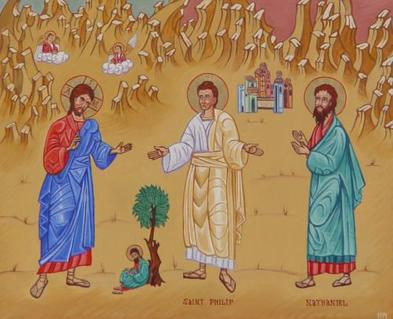 Last week Kathleen and I took the kids to go see the remake of the classic movie Jumanji. The original starred Robin Williams as a man who unlocks an ancient curse when he accepts the challenge to play an old board game he found. The only way to stop the curse from destroying everything in his life is to play the game to the end… And of course win. In this latest version, the storyline has been modernized a bit. It begins with four high school kids from different social groups who, as part of their detention, have to clean out an old storage room. It’s there they discover an ancient video game player from way back in the digital dark ages of the 1990’s. Tempted by boredom, or curious by nature, the kids plug in the machine and accept the invitation to play Jumanji. And as a result they too unlock the curse. But instead of the game coming to life in their world, as it did in the original, the four teens become a part the game. Their only way out is to play the game…and win. One might say the moral of this tale is be mindful when accepting invitations. You never know what adventure might unfold. Today’s gospel reading is an invitation to a different kind of adventure. (John 1:43-51) What we know up to this point is that Jesus had begun to gather his disciples. First is Andrew, followed by his brother Peter. The next day Jesus invites Philip to follow him. And in return Philip invites Nathanael to come and see what they’re up to. If you are familiar with the Bible, you might not see anything unordinary about this. But if you’re not, you’re probably wondering what on earth made Nathanael, or any of the disciples, give up his life to follow this guy? So far Jesus hasn’t performed any miracles, shown any signs, or made proclamations about the reign of God that might excite one’s imagination. We don’t know much about Nathanael, but I picture him as an inquisitive young adult, or bored teenager. He’s in that juncture in his life when one questions the world and your purpose and place in it. Imagine his state of mind when, from out of nowhere, Philip runs up screaming about finding the one Moses and the prophets wrote about, “And he’s from Nazareth of all places!” Nathanael can’t help but asks, “Can anything good come out of Nazareth?” Taking Jesus’ words and putting them into action, Philip invites his friend to, “Come and see.” In light of last week’s message, Philip is offering Nathanael an invitation to experience an epiphany. If you want to know what God has in store for you, then come and see what God reveals in Jesus for you. Those who Jesus has called to be his disciples the message is the same, “Come and see.” And they do. Epiphany after epiphany, God reveals God’s self to them through Jesus Christ. But only after a brutal death and a miraculous resurrection will they be able to see God standing right in front of them. This will be their epiphany, realizing that God has always been here and has never stopped redeeming the world back home to His divine love. What this story teaches us is that our quest, or whatever we are seeking, is answered in our ability to see Jesus for who he really is. But be warned, he’s not always what we’re looking for. For example, poor Nate can’t quite figure out why the Messiah come from some backwoods, insignificant village like Nazareth. You might wonder why he would come in to your messiness and call a person like you. In his gospel story, John uses Nathanael’s inquiry to makes two powerful claims. First, God can accomplish great things, especially in the most unlikely of places. In a filthy stable, a corrupt government, a broken heart of a failed marriage, or the deep darkness of an ugly addiction, God is present and powerful in all our personal Nazareths. Second, God is perfectly capable of honoring ordinary people and calling them to do extraordinary things. From Moses to Mary, to the bumbling disciples to each one of us, everyone has a place and a purpose in God’s Kingdom no matter who we are or where we are found. In Jumanji, four ordinary high-school kids with ordinary teenage problems found themselves in the characters of the video game. Through a series of unfortunate events, not only do they discover what they are capable of, but also who they’re destined to be. Had they not accepted the invitation to play, they might not have discovered their true self. The same can be said about each one of us. Jesus invites us to come and see, not just so we see who he is but so we can discover who we are because of who he is; the Messiah, Son of God, our Savior. Jesus shows up from the Nazareths of our life. And he calls us out from under the fig tree. He invites you to walk with him and learn how to live; to listen to him and learn how to speak truth and peace; to meet him in everyone you meet, and discover inside yourself a love you never thought possible. In spite of all the opposition and every obstacle and challenge, if you persist and make Jesus a life habit, not only will God be revealed to you, but you will also see the true image of God bloom within you. Jesus not only invites us to come and see, but he calls us out to follow him; to come and play in God’s world. This is it important to note because every day we receive invitations to do things that pull us away from our being One with God. Friends invite us to share gossip. Co-workers invite us to have an affair. Drugs invite us to abuse our mind and bodies. Parents invite us to self-doubt. Of course, social media and technology tempt us to run and hide in an alternative reality. Jesus invites us to live life well. And to live it abundantly. To share the good news, here and now. And to bear the good fruit of God’s eternal glory, today and tomorrow. For every Nazareth there is an invitation. Through Christ, God invites us to “Come,” let go of pain, fear, anger, addictions and practices that harm yourself and others. Through Christ, God invites us to, “See” how the power of the Living Word can transform you. “Come and see” is an invitation to “Go and be.” Like Nathanael and Philip and all those before us have discovered, whenever we leave the fig tree… we open ourselves to see God fully present and at work in the most unexpected places. And in the most unassuming people; you and me. But God’s invitation is one that requires an RSVP to see God’s great epiphany that draws us home to God’s divine truth and love. So Come. See. Follow. Go. Be. And Do. Work Cited Bartlett, David L., Barbara Brown Taylor. Feasting on the Word, Year B vol. 1. Louisville: Westminster John Knox, 2008. pp. 260-264. Marsh, Michael. interruptingthesilence.com. Jan 16, 2012. (accessed Jan 13, 2018). “The Word became flesh and dwelt among us” (John 1:14).
John's prologue is one of my favorite parts of the Bible. Not for the typical Christological themes that speak volumes to who Jesus is as the Messiah (pre and post incarnation), but only because it offers me the soothing reassurance that God chose to dwell among us. God came to be with us. God wanted to live in our world (for all that is good and bad) to to guide us back to His. Notice John's Gospel does not just say “Jesus,” but “flesh.” This is the meat and potatoes of faith: God is a part of us. And we are a part of God. We are made in God's image, just as Jesus was. But perhaps this phrase is so tired and used that we forget what that flesh means - our bloodline, our heritage, our true self is born and sculpted in the Divine. As divine creatures of a loving God our job is to be the representative of that love in the world. The practical nature of this is this: We are God's love, and God's love is us. So when you get up in the morning, we must begin our day by asking “What aspect of God, what aspect of Love, am I being called to incarnate in the world today?" Simply put, "How can I be Jesus today?” Inspired by the words of Richard Rohr ...and they will not have the need of the light of a lamp |
Ian MacdonaldAn ex-copywriter turned punk rock pastor and peacemaker who dedicates his life to making the world a better place for all humanity. "that they all might be one" ~John 17:21“Prius vita quam doctrina.”
~ St. Thomas Aquinas (1225–1274) * “Life is more important than doctrine.”
Archives
June 2024
|

